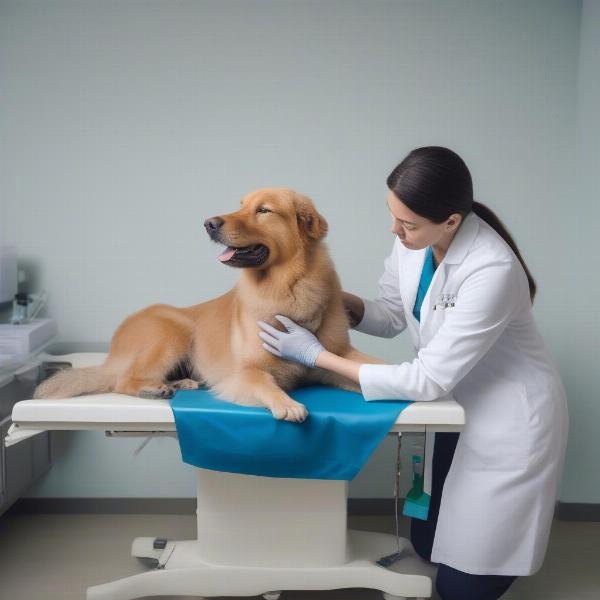Colic in dogs, though less common than in horses, can be a distressing experience for both the pet and the owner. It manifests as abdominal pain, often sudden and severe, and can range from mild discomfort to a life-threatening emergency. Understanding the signs, causes, and potential treatments is crucial for every dog owner.
What Causes Colic in Dogs?
Colic isn’t a disease itself but a symptom of an underlying problem. Several factors can contribute to canine colic, ranging from simple dietary indiscretion to serious medical conditions. Some common causes include:
- Dietary Indiscretion: Eating spoiled food, garbage, or foreign objects can lead to gastrointestinal upset and colic.
- Gas: Excessive gas buildup in the intestines can cause painful distension and cramping.
- Intestinal Obstruction: Blockages caused by foreign bodies, tumors, or intussusception (telescoping of the intestines) can lead to severe colic.
- Gastric Dilatation-Volvulus (GDV): Commonly known as bloat, this life-threatening condition involves the stomach twisting and filling with gas, requiring immediate veterinary intervention.
- Pancreatitis: Inflammation of the pancreas can cause intense abdominal pain.
- Inflammatory Bowel Disease (IBD): Chronic inflammation of the digestive tract can lead to recurring episodes of colic.
- Intestinal Parasites: Worms and other parasites can irritate the intestinal lining and cause discomfort.
Recognizing the Signs of Colic in Your Dog
Identifying colic in dogs can be challenging, as they cannot verbalize their pain. However, several telltale signs can indicate abdominal discomfort. These include:
- Restlessness and pacing: The dog may seem unable to find a comfortable position.
- Hunched posture or arched back: This indicates abdominal pain.
- Whining or groaning: Vocalizations of discomfort are common.
- Excessive salivation and lip licking: Often seen in nauseous dogs.
- Vomiting and/or diarrhea: These can be signs of gastrointestinal upset.
- Loss of appetite: A dog in pain may refuse to eat.
- Distended abdomen: A swollen belly can indicate gas buildup or bloat.
- Rapid breathing or panting: Signs of pain and distress.
When to Seek Veterinary Care
If your dog exhibits any signs of colic, it’s crucial to contact your veterinarian immediately. Some causes of colic, such as GDV, are life-threatening and require immediate surgical intervention.  Veterinarian Examining Dog Delaying treatment can significantly worsen the prognosis.
Veterinarian Examining Dog Delaying treatment can significantly worsen the prognosis.
Diagnosing and Treating Colic
Your veterinarian will perform a thorough physical examination and may recommend additional diagnostic tests, such as blood work, X-rays, or ultrasound, to determine the underlying cause of the colic. Treatment will depend on the diagnosis and may include:
- Pain medication: To alleviate discomfort.
- Intravenous fluids: To correct dehydration and electrolyte imbalances.
- Anti-nausea medication: To control vomiting.
- Dietary changes: A bland diet may be recommended to soothe the digestive system.
- Surgery: In cases of intestinal obstruction or GDV, surgery is often necessary.
- Medication for underlying conditions: Such as antibiotics for infections or anti-inflammatory drugs for IBD.
Conclusion
Colic in dogs can be a serious issue, and prompt veterinary attention is essential. By being aware of the signs, causes, and treatment options, you can help your furry friend receive the necessary care and ensure a positive outcome. Don’t hesitate to contact your veterinarian if you suspect your dog is experiencing colic.
FAQ
- How can I prevent colic in my dog? Feed a high-quality diet, avoid sudden dietary changes, and prevent your dog from scavenging.
- Is colic always a medical emergency? While some cases of colic are mild, others can be life-threatening. Always err on the side of caution and contact your vet.
- What is the prognosis for dogs with colic? The prognosis depends on the underlying cause and the promptness of treatment.
- Can stress cause colic in dogs? Stress can contribute to gastrointestinal upset, which may lead to colic.
- Are certain breeds more prone to colic? Large, deep-chested breeds are more susceptible to GDV, a serious form of colic.
Related Articles:
About ILM Dog:
ILM Dog provides expert advice on dog breeds, health, training, nutrition, grooming, and accessories. We offer a wealth of information for both new and experienced dog owners. From choosing the right breed to understanding complex health issues like colic, ILM Dog is your trusted source for all things canine. Contact us for personalized advice and support: Email: [email protected], Phone: +44 20-3965-8624.